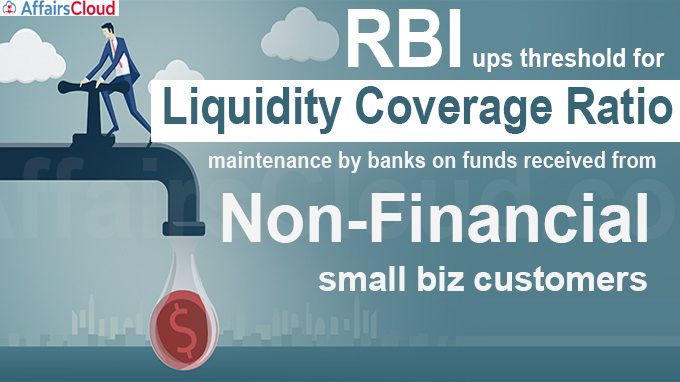 The Reserve Bank of India (RBI) has increased the threshold limit for Banks to maintain the Liquidity Coverage Ratio (LCR) on deposits and other ‘extension of funds’ received from non-financial small business customers from Rs 5 crore to Rs 7.5 crore (Increased by 50%).
The Reserve Bank of India (RBI) has increased the threshold limit for Banks to maintain the Liquidity Coverage Ratio (LCR) on deposits and other ‘extension of funds’ received from non-financial small business customers from Rs 5 crore to Rs 7.5 crore (Increased by 50%).
- Objective: To better align RBI’s guidelines with the Basel Committee on Banking Supervision (BCBS) standard and enable banks to manage liquidity risk more effectively.
Key Points:
i.Applicability: The threshold limit will be applicable to all Commercial Banks other than Regional Rural Banks, Local Area Banks, and Payments Banks.
ii.Hence, all commercial banks should maintain LCR if they receive deposits and other ‘extension of funds’ of Rs 7.5 crore and above from non-financial small business customers.It is Based on revised ‘Basel III Framework on Liquidity Standards – Net Stable Funding Ratio (NSFR)
- The extension of funds refers to the funds in banks in the form of retail exposures which are generally considered as having similar liquidity risk characteristics to retail accounts
iii.The LCR requirement was introduced as part of post-Global Financial Crisis (GFC) reforms, BCBS, which requires banks to maintain High-Quality Liquid Assets (HQLAs) to meet 30 days net outgo under stressed conditions.
iv.HQLAs:
- It includes cash reserves in excess of the required cash reserve ratio and government securities (G-Secs) in excess of the minimum statutory liquidity ratio requirement.
- It also includes, within the mandatory SLR (Statutory Liquidity Ratio) requirement, G-Secs to the extent allowed by RBI under Marginal Standing Facility, and marketable securities issued or guaranteed by foreign sovereigns.
- The new norms retain the net stable funding ratio at 90 per cent of the liabilities as the available stable funding factor, which comprise demand deposits and/or term deposits with residual maturities of retail and small business customers under one-year maturity.
Note – Corporate deposits are considered not stable deposits as they are parked for business use. Smaller deposits are considered stable as they also form part of savings.
Recent Related News:
In December 2021, the Reserve Bank of India (RBI) has mandated the companies to quote the 20-digit Legal Entity Identifier (LEI) for cross-border transactions for capital or current account transactions of Rs 50 crore and above, from October 1 2022.
About Reserve Bank of India (RBI):
Established – 1st April 1935
Headquarters– Mumbai, Maharashtra
Governor– Shaktikanta Das
Deputy Governors – Mahesh Kumar Jain, Michael Debabrata Patra, M. Rajeshwar Rao, T. Rabi Sankar




